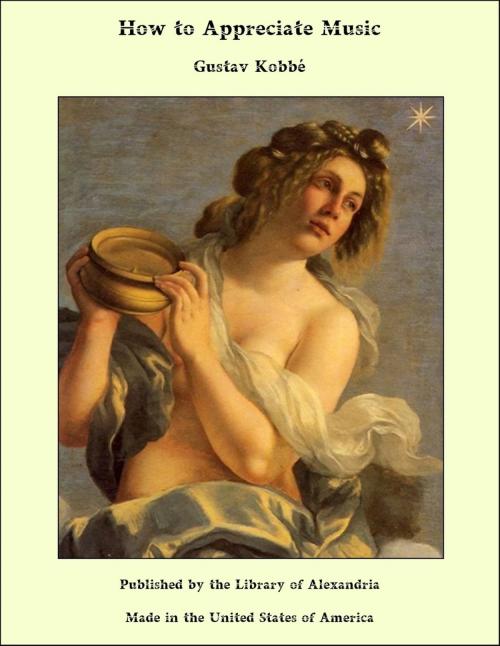| Author: | Gustav Kobbé | ISBN: | 9781465543363 |
| Publisher: | Library of Alexandria | Publication: | March 8, 2015 |
| Imprint: | Language: | English |
| Author: | Gustav Kobbé |
| ISBN: | 9781465543363 |
| Publisher: | Library of Alexandria |
| Publication: | March 8, 2015 |
| Imprint: | |
| Language: | English |
This book is planned for the lover of music, for those who throng the concert and recital halls and the opera—those who have not followed music as a profession, and yet love it as an art; who may not play or sing, and yet are musical. Among these is an ever-growing number that “wants to know,” that no longer is satisfied simply with allowing music to play upon the senses and the emotions, but wants to understand why it does so. To satisfy this natural desire which, with many, amounts to a craving or even a passion, and to do so in wholly untechnical language and in a manner that shall be intelligible to the average reader, is the purpose of this book. In carrying it out I have not neglected the personal side of music, but have endeavored to keep clearly before the eyes of the reader, and in their proper sequence, the great names in musical history. I am somewhat of a radical in my musical opinions, one of those persons of advanced views who does not lift his eyes reverentially heavenward every time the words “symphony” and “sonata” are mentioned. In fact, I am most in sympathy with the liberating tendencies of modern music, which lays more stress upon the expression of life and truth than upon the exact form in which these are sought to be expressed. Nevertheless, I am quite aware that only through the gradual development and expansion of forms that now may be growing obsolete has music achieved its emancipation from the tyranny of form. Therefore, while I would rather listen to a Wagner music-drama than to a Mozart opera, or might go to more trouble to hear a Richard Strauss tone poem than a Beethoven symphony, I am not such an unconscionable heretic as to be unaware of the great, the very great part played by the Mozart opera and the Beethoven symphony in the evolution of music, or their importance in the orderly and systematic study of the art. Indeed, I was brought up on “Don Giovanni,” the Fifth Symphony and the Sonatas before I brought myself up on Chopin, Liszt (for whom I have far greater admiration than most critics), and Wagner. Therefore, an ample portion of this book will be found devoted to the classical epoch and its great masters, especially its greatest master, Beethoven, and to the forms in which they worked. Nor do I think that these pages will be found written unsympathetically. But something is due the great body of music-lovers who, being told that they must admire this, that and the other classical composer, because he is classical, find themselves at a loss and think themselves to blame because modern music makes a more vivid and deeper impression upon them. If they only knew it—they are in the right! But they have needed some one to tell them so.
This book is planned for the lover of music, for those who throng the concert and recital halls and the opera—those who have not followed music as a profession, and yet love it as an art; who may not play or sing, and yet are musical. Among these is an ever-growing number that “wants to know,” that no longer is satisfied simply with allowing music to play upon the senses and the emotions, but wants to understand why it does so. To satisfy this natural desire which, with many, amounts to a craving or even a passion, and to do so in wholly untechnical language and in a manner that shall be intelligible to the average reader, is the purpose of this book. In carrying it out I have not neglected the personal side of music, but have endeavored to keep clearly before the eyes of the reader, and in their proper sequence, the great names in musical history. I am somewhat of a radical in my musical opinions, one of those persons of advanced views who does not lift his eyes reverentially heavenward every time the words “symphony” and “sonata” are mentioned. In fact, I am most in sympathy with the liberating tendencies of modern music, which lays more stress upon the expression of life and truth than upon the exact form in which these are sought to be expressed. Nevertheless, I am quite aware that only through the gradual development and expansion of forms that now may be growing obsolete has music achieved its emancipation from the tyranny of form. Therefore, while I would rather listen to a Wagner music-drama than to a Mozart opera, or might go to more trouble to hear a Richard Strauss tone poem than a Beethoven symphony, I am not such an unconscionable heretic as to be unaware of the great, the very great part played by the Mozart opera and the Beethoven symphony in the evolution of music, or their importance in the orderly and systematic study of the art. Indeed, I was brought up on “Don Giovanni,” the Fifth Symphony and the Sonatas before I brought myself up on Chopin, Liszt (for whom I have far greater admiration than most critics), and Wagner. Therefore, an ample portion of this book will be found devoted to the classical epoch and its great masters, especially its greatest master, Beethoven, and to the forms in which they worked. Nor do I think that these pages will be found written unsympathetically. But something is due the great body of music-lovers who, being told that they must admire this, that and the other classical composer, because he is classical, find themselves at a loss and think themselves to blame because modern music makes a more vivid and deeper impression upon them. If they only knew it—they are in the right! But they have needed some one to tell them so.















